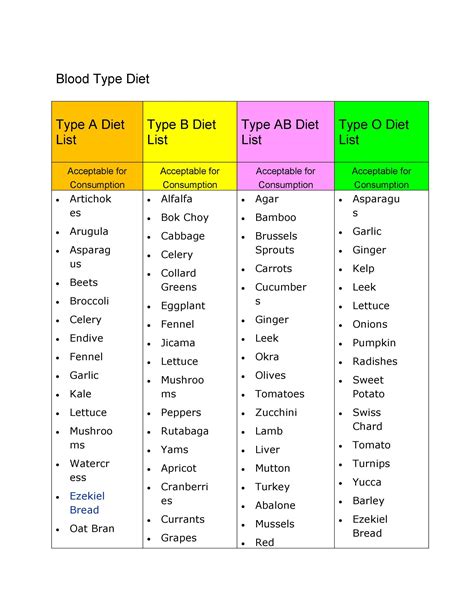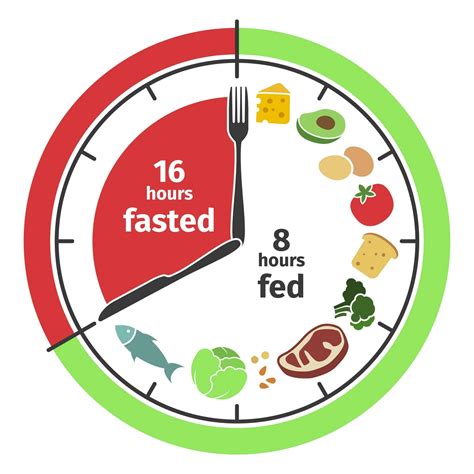Discover the impact of blood type on diet and how to customize your eating plan for optimal health benefits. Get tips for following the blood type diet.
Understanding Blood Type Diet
Contents
Blood type diet is a nutritional plan based on an individual’s blood type. The concept behind this diet is that different blood types react differently to certain foods. The idea is that by eating according to your blood type, you can improve your overall health and reduce the risk of certain diseases.
There are four main blood types: A, B, AB, and O. Each blood type has its own specific dietary recommendations. For example, those with type A blood are advised to follow a vegetarian diet, while type O individuals are recommended to consume a high-protein diet.
The impact of blood type on diet can be seen in how certain foods are beneficial for one blood type but harmful for another. The theory suggests that by eating foods that are compatible with your blood type, you can enhance your immune system and promote better overall health. However, it’s important to note that the scientific evidence supporting this theory is limited, and more research is needed to fully understand the potential benefits of the blood type diet.
Customizing diet for each blood type involves eliminating certain foods and incorporating others based on individual blood type. This means that individuals may need to be more conscious of their food choices to align with their blood type recommendations. For example, someone with type B blood may be advised to avoid corn, wheat, and lentils, and focus on consuming more green vegetables, meat, and low-fat dairy products.
The health benefits of blood type diet are said to include improved digestion, weight management, and overall immune system support. However, it’s important to approach any diet plan with caution and consult with a healthcare professional before making significant changes to your eating habits. Additionally, a balanced and varied diet that includes a range of nutrients is fundamental for good health, regardless of blood type.
Impact of Blood Type on Diet
The blood type diet is a popular way of eating that is based on an individual’s blood type. The idea behind this diet plan is that the foods you eat react chemically with your blood type. This means that following a diet designed specifically for your blood type can help you digest food more efficiently, prevent diseases and lose weight. The impact of blood type on diet is significant, as different blood types require different types of nutrients for optimal health.
For example, individuals with type O blood are believed to thrive on a high-protein diet and should avoid dairy and gluten. Meanwhile, those with type A blood are encouraged to stick to a vegetarian diet, and people with type B blood are recommended to consume a balanced diet with a variety of foods including meat, dairy, and produce. Lastly, individuals with type AB blood are advised to eat a combination of the diets for type A and type B. Therefore, it’s clear that knowing your blood type can have a profound effect on your dietary choices.
Following a diet based on your blood type can also have a positive impact on your overall health. Proponents of the blood type diet believe that eating foods tailored to your blood type can help lower the risk of chronic diseases such as heart disease, cancer, and diabetes. In addition, people often report feeling more energetic, losing weight, and experiencing better digestion after adhering to their blood type’s recommended diet.
Ultimately, the impact of blood type on diet is undeniable. By understanding the connection between your blood type and the foods you eat, you can customize your diet to better suit your individual nutritional needs and improve your overall well-being.
Customizing Diet for Each Blood Type
When it comes to maintaining a healthy diet, *customizing* it according to your *blood type* can play a significant role in improving your overall health. The *Blood Type Diet*, also known as the *Eat Right for Your Blood Type* diet, emphasizes the consumption of food that is most compatible with an individual’s blood type. This concept was introduced by Dr. Peter D’Adamo, who believed that each blood type has a unique genetic makeup that influences how the body responds to different foods.
For individuals with blood type O, it is recommended to focus on a high-protein diet that includes lean meats, poultry, fish, and vegetables. On the other hand, those with blood type A are advised to follow a primarily vegetarian diet, while individuals with blood type B are encouraged to consume a diverse diet that includes meat, dairy, and grains. Lastly, individuals with blood type AB are advised to focus on a balanced diet that incorporates a variety of foods.
By *customizing* your diet based on your blood type, you can potentially improve your digestive health, energy levels, and overall well-being. While the concept of the *Blood Type Diet* has been met with mixed reviews from the medical community, many individuals have reported experiencing positive results after making dietary changes based on their blood type.
It’s important to note that the *Blood Type Diet* is not a one-size-fits-all approach, and individual responses to specific foods can vary. Additionally, consulting with a healthcare professional or a registered dietitian is recommended before making significant changes to your diet based on your blood type.
Health Benefits of Blood Type Diet
Health Benefits of Blood Type Diet
Health Benefits of Blood Type Diet
The blood type diet is a nutritional plan based on an individual’s blood type. It is believed that each blood type has specific dietary requirements and that following a diet tailored to one’s blood type can lead to a number of health benefits.
For individuals with type O blood, following a diet that is high in protein and low in grains and dairy can improve their energy levels and aid in weight loss. People with type A blood may benefit from a diet that focuses on vegetarian foods and is low in red meat, which can reduce their risk of heart disease and cancer.
Those with type B blood are often advised to consume a varied diet that includes a balance of meats, dairy, and grains, which may help improve their immune system and digestive health. Finally, individuals with type AB blood are recommended to follow a primarily vegetarian diet that is rich in protein and low in processed foods, which can help with digestion and promote overall well-being.
The health benefits of following a blood type diet include improved energy levels, better digestion, weight management, and a reduced risk of developing certain chronic illnesses. By understanding the unique nutritional needs associated with each blood type, individuals can tailor their diet to support their overall health and well-being.
Tips for Following Blood Type Diet
Tips for Following Blood Type Diet
Following a blood type diet can be challenging, but it can also be incredibly beneficial for your overall health and well-being. Whether you have Type A, B, AB, or O blood, there are certain tips that can help you make the most of your blood type diet and improve your overall health.
One important tip for following a blood type diet is to focus on whole, unprocessed foods that are beneficial for your specific blood type. For example, individuals with Type O blood may thrive on a high-protein diet, while those with Type A blood may benefit from a more plant-based diet. Understanding which foods are most beneficial for your blood type can help you make informed choices when planning your meals.
In addition to focusing on the right types of foods for your blood type, it’s also important to pay attention to how food combinations can impact your health. For example, individuals with Type B blood may find that they feel better when they avoid certain combinations of foods, while those with Type AB blood may thrive on a balanced diet that includes a variety of food groups in each meal.
Another tip for following a blood type diet is to pay attention to how your body responds to different foods. Keeping a food diary can help you track your energy levels, digestive health, and overall well-being after eating certain foods. This can provide valuable insight into which foods are best for your blood type and which ones may be causing negative symptoms or reactions.
Finally, it’s important to remember that following a blood type diet is not a one-size-fits-all approach. It’s important to listen to your body, pay attention to how different foods make you feel, and make adjustments to your diet based on your own unique needs and preferences. By taking a personalized approach to your blood type diet, you can optimize your health and well-being in a way that is truly tailored to your individual needs.












